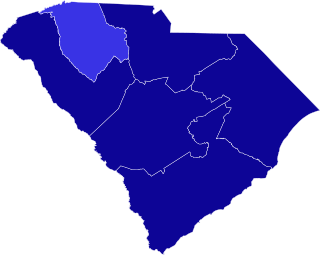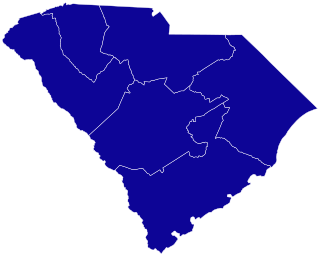
The 1956 United States House of Representatives elections in South Carolina were held on November 6, 1956, to select six Representatives for two-year terms from the state of South Carolina. All five incumbents who ran were re-elected and the open seat in the 5th congressional district was retained by the Democrats. The composition of the state delegation thus remained solely Democratic.

The 1962 United States House of Representatives elections in South Carolina were held on November 6, 1962 to select six Representatives for two-year terms from the state of South Carolina. The primary elections were held on June 12 and the runoff elections were held two weeks later on June 26. All five incumbents who ran were re-elected and the open seat in the 2nd congressional district was retained by the Democrats. The composition of the state delegation thus remained solely Democratic.

The 1944 United States House of Representatives elections in South Carolina were held on November 7, 1944, to select six Representatives for two-year terms from the state of South Carolina. All five incumbents who ran were re-elected and the open seat in the 2nd congressional district was retained by the Democrats. The composition of the state delegation thus remained solely Democratic.

The 1946 United States House of Representatives elections in South Carolina were held on November 5, 1946 to select six Representatives for two-year terms from the state of South Carolina. Five incumbents were re-elected, but Butler B. Hare of the 3rd congressional district was defeated in the Democratic primary by W.J. Bryan Dorn. The seat remained with the Democrats and the composition of the state delegation remained solely Democratic.

The 1952 United States House of Representatives elections in South Carolina were held on November 4, 1952 to select six Representatives for two-year terms from the state of South Carolina. All six incumbents were re-elected and the composition of the state delegation remained solely Democratic.

The 1936 United States House of Representatives elections in South Carolina were held on November 2, 1936, to select six Representatives for two-year terms from the state of South Carolina. All five incumbents who ran were re-elected and the open seat in the 4th congressional district was retained by the Democrats. The composition of the state delegation thus remained solely Democratic.

The 1904 United States House of Representatives elections in South Carolina were held on November 8, 1904 to elect seven representatives Representatives for one two-year terms from the state of South Carolina. All five incumbents who ran were re-elected and the open seats in the 2nd congressional district and 6th congressional district were retained by the Democrats. The composition of the state delegation thus remained solely Democratic.

The 1908 United States House of Representatives elections in South Carolina were held on November 3, 1908, to select seven Representatives for two-year terms from the state of South Carolina. All seven incumbents were re-elected and the composition of the state delegation remained solely Democratic.

The 1912 United States House of Representatives elections in South Carolina were held on November 5, 1912 to select seven Representatives for two-year terms from the state of South Carolina. Six incumbents were re-elected, but J. Edwin Ellerbe of the 6th congressional district was defeated in the Democratic primary. The seat was retained by the Democrats and the composition of the state delegation remained solely Democratic.

The 1914 United States House of Representatives elections in South Carolina were held on November 3, 1914 to select seven Representatives for two-year terms from the state of South Carolina. The primary elections were held on August 25 and the runoff elections were held two weeks later on September 8. All seven incumbents were re-elected and the composition of the state delegation remained solely Democratic.

The 1916 United States House of Representatives elections in South Carolina were held on November 7, 1916 to select seven Representatives for two-year terms from the state of South Carolina. The primary elections were held on August 29 and the runoff elections were held two weeks later on September 12. Six incumbents were re-elected, but Wyatt Aiken of the 3rd congressional district was defeated in the Democratic primary. The seat was retained by the Democrats and the composition of the state delegation remained solely Democratic.

The 1920 United States House of Representatives elections in South Carolina were held on November 2, 1920, to select seven Representatives for two-year terms from the state of South Carolina. Four incumbents were re-elected and all three open seats were retained by the Democrats. The composition of the state delegation thus remained solely Democratic.

The 1922 United States House of Representatives elections in South Carolina were held on November 7, 1922, to select seven Representatives for two-year terms from the state of South Carolina. Six incumbents were re-elected and the open seat in the 6th congressional district was retained by the Democrats. The composition of the state delegation thus remained solely Democratic.

The 1888 United States House of Representatives elections in South Carolina were held on November 6, 1888, to select seven Representatives for two-year terms from the state of South Carolina. All seven incumbents were initially reported as re-elected and the composition of the state delegation remained solely Democratic, however Thomas E. Miller successfully contested the result in the 7th congressional district, claiming voter suppression of black Republican votes.

The 1900 United States House of Representatives elections in South Carolina was held on Tuesday November 6, to elected seven United States Representatives of South Carolina. Five Democratic incumbents were re-elected and two incumbents were defeated in the primaries, but the seats were retained by the Democrats. The composition of South Carolina delegation after the election was solely Democratic.

The 1924 United States House of Representatives elections in South Carolina were held on November 4, 1924, to select seven Representatives for two-year terms from the state of South Carolina. Five incumbents were re-elected and the two open seats were retained by the Democrats. The composition of the state delegation thus remained solely Democratic.

The 1902 United States House of Representatives elections in South Carolina were held on November 4, 1902 to select seven Representatives for two-year terms from the state of South Carolina. Four incumbents were re-elected and the three open seats were retained by the Democrats. The composition of the state delegation after the election was solely Democratic.

The 1906 United States House of Representatives elections in South Carolina were held on November 6, 1906, to select seven Representatives for two-year terms from the state of South Carolina. All seven incumbents were re-elected and the composition of the state delegation remained solely Democratic.

The 1918 United States House of Representatives elections in South Carolina were held on November 5, 1918 to select seven Representatives for two-year terms from the state of South Carolina. The primary elections were held on August 27 and the runoff elections were held two weeks later on September 10. All seven incumbents were re-elected and the composition of the state delegation remained solely Democratic.





